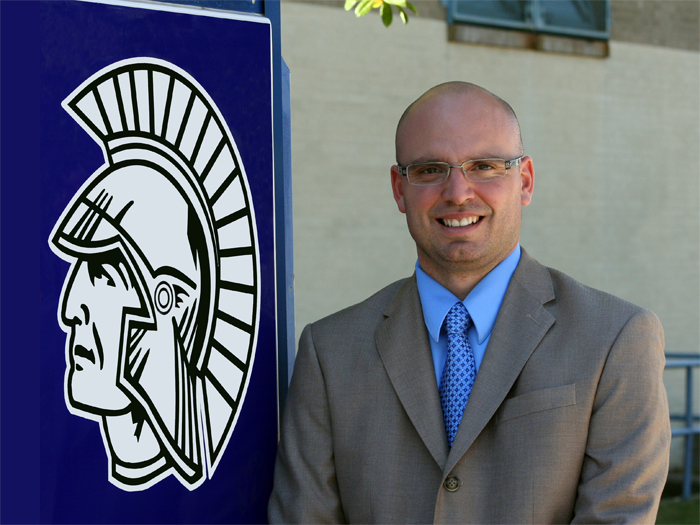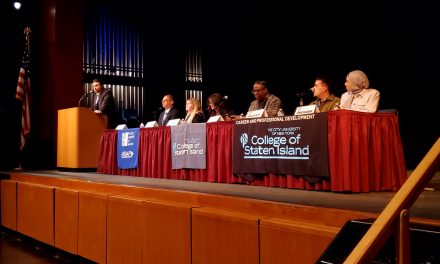Dr. Susan Smith-Peter, Professor of History at the College of Staten Island, as part of her research project for the John J. Marchi Fellowship, is inviting contributions to her project, “Lockdown Staten Island,” which explores the COVID lockdown and its effect on the Borough through photos, videos, and testimonials. The project, spanning three academic semesters, has incorporated Dr. Smith-Peter’s students as her research collaborators and is part of the College of Staten Island’s Public History program.
The John J. Marchi Fellowship allows for a member of the Humanities and Social Sciences faculty to explore projects that provide public-facing content specific to the Borough and its residents. Dr. Smith-Peter, who received the Fellowship starting the spring 2022 semester, chose to explore the lockdown and the physical and psychological effects it had on the residents of Staten Island.
“When lockdown happened, I realized there was going to be a need to preserve the experiences of Staten Islanders specifically and I felt that if the Public History program didn’t do it then it might not happen,” Dr. Smith-Peter explained. “In fact, it turned out that a lot of the Staten Island photos and videos in the recent Museum of New York’s COVID exhibit came from our project, and so it became a way to make sure that the story of Staten Island was actually represented in the larger history of COVID-19 in New York City.”
Resources from the Marchi Fellowship allowed Dr. Smith-Peter to work through materials for the project gathered via social media. From the start of the pandemic, the public history program had asked the Staten Island community to contribute their stories and media, principally through a Facebook page “CSI Public History Coronavirus Chronicle.” The page garnered a lot of engagement, and with the help of her Research Assistant Melissa Cipoletti and students in her Public History (HST 718) class, the group was able to categorize the submissions into several powerful themes such as disorientation, fear, scarcity, isolation, and resilience, emotions that epitomized what Staten Islanders were feeling at the time of the lockdown.
“One of the things that was really amazing to me was that people would submit very intense and personal things, like the death of a parent or loved one, and I could write back in real time and tell them how important their story is for history and how, in fact, it would be preserved in history,” Dr. Smith-Peter explained. “Too often, we are not able to apply the balm of history directly to the person who is actually providing the primary source material, but it’s a very powerful and intense feeling and not something I expected going into the project. Just because someone puts something very personal on their own sites or social media feeds doesn’t mean it becomes part of history. Our project is chronicling the often-forgotten story of Staten Islanders in the COVID-19 pandemic in New York City.”
Dr. Smith-Peter and her colleagues have since taken the results of the collection of stories, photos, videos, and other materials, and produced a trailer for what will be an eventual documentary they hope to unveil to the public at the close of the semester, chronicling the lockdown. In the meantime, they will debut the trailer on February 24 via a Zoom panel discussion and at a series of events designed to help more people contribute. As noted, the range of Staten Island-related material has been a part of other larger work, such as The Museum of the City of New York’s recent exhibit to chronicle NYC’s experience of the pandemic, which featured seven submissions from the CSI Public History Coronavirus Chronicle Facebook Page chosen from more than 20,000 submissions.
Dr. Smith-Peter is hoping that the community, including the campus of the College of Staten Island, will help in the push for more materials. The Fellowship team has set a deadline date for submission of March 31 before they begin work on their final, public-facing, project.
“It’s really important that we continue to get submissions because we want a fully rounded view and more points of view from a broader range of communities and representatives,” she said.
Dr. Smith-Peter is hoping that the final product offers Staten Islanders a chance to be seen and provide some catharsis after COVID’s continued effect on the Borough. “I think it’s important for Staten Islanders to look at our project and say, ‘I was there, I saw that, I went through that, and it is now being reflected back to me in this piece,’” she said. “That sense of being seen and having our experiences validated and shared with the world is very important.”
Those interested in submitting materials can do so at the Lockdown Staten Island Website. For more info on the Lockdown Staten Island project, contact Dr. Susan Smith Peter at susan.smithpeter@csi.cuny.edu.


















